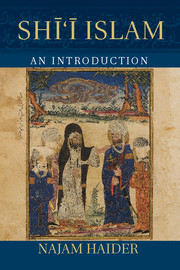Book contents
- Frontmatter
- Dedication
- Contents
- List of Tables and Maps
- Acknowledgments
- Note on the Cover Image
- A Note on Transliteration and Dating
- Maps
- Introduction
- Section 1 Theology
- Section 2 Origins
- Section 3 Constructing Shī‘ism
- Section 4 Shī‘ism in the Modern World
- 8 Zaydism at the Crossroads
- 9 (Nizārī) Ismā‘īlism Reconstituted
- 10 The Politicization of the Twelver Shī‘a
- Conclusion Sunnī–Shī‘ī Relations
- Appendix Verses Mentioned in the Argument from Qur’ānic Expectations in Chapter 3
- Index
- References
Conclusion - Sunnī–Shī‘ī Relations
Published online by Cambridge University Press: 05 August 2014
- Frontmatter
- Dedication
- Contents
- List of Tables and Maps
- Acknowledgments
- Note on the Cover Image
- A Note on Transliteration and Dating
- Maps
- Introduction
- Section 1 Theology
- Section 2 Origins
- Section 3 Constructing Shī‘ism
- Section 4 Shī‘ism in the Modern World
- 8 Zaydism at the Crossroads
- 9 (Nizārī) Ismā‘īlism Reconstituted
- 10 The Politicization of the Twelver Shī‘a
- Conclusion Sunnī–Shī‘ī Relations
- Appendix Verses Mentioned in the Argument from Qur’ānic Expectations in Chapter 3
- Index
- References
Summary
On the morning of February 22, 2006, a bomb blast ripped through the al-Askarī Mosque in the Iraqi city of Samarra. Al-Qā‘ida's affiliate in Iraq took responsibility for the attack, which triggered a wave of violence between Sunnī and Shī‘ī Muslims that lasted almost two years and (according to the United Nations High Commissioner for Refugees) created nearly 370,000 refugees. The violence transformed the demographics of entire cities. Neighborhoods previously home to both Sunnīs and Shī‘a were increasingly identified with a single religious community. The intensity of the reaction to the bombing stemmed from the site's importance for the Twelver Shī‘a, as the complex houses the tombs of the tenth and eleventh Imāms and marks the location of the disappearance of the twelfth Imām.
Since 2006, conflict between Sunnīs and Shī‘a has featured prominently in media coverage of the Muslim world. Pakistan, a hotbed of Sunnī–Shī‘a violence for decades, has seen a dramatic escalation of attacks over the past five years against Shī‘ī groups in Karachi and Lahore by Sunnī paramilitary organizations that operate outside governmental control. Since 2010, the Malaysian government has organized a systematic campaign against the country's small Shī‘ī population. The Syrian civil war that erupted in 2011 pits a government dominated by an Alawite (Nuṣayrī) Shī‘ī community and backed by the Twelver Shī‘ī regime in Iran against a coalition of groups supported by the Sunnī monarchies of the Arabian Peninsula. There are also regular reports of anti-Shī‘ī violence from Egypt, Bahrain, Saudi Arabia, and the United Arab Emirates.
- Type
- Chapter
- Information
- Shi'i IslamAn Introduction, pp. 218 - 228Publisher: Cambridge University PressPrint publication year: 2014



